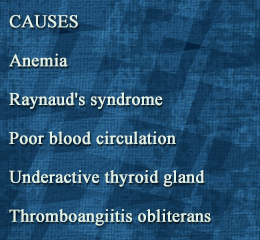Are your feet and hands cold most of the time? Cold feet and hands could be a symptom of some underlying disease or disorder. The following write-up will help you understand the causes in detail, besides highlighting some useful treatment options.

While having cold feet and hands during winter is not really a cause of concern, it has been observed that some people face this problem continuously, regardless of the climate, while others get cold hands and feet at night only. Though most of the time we do not give much attention to this problem, it can be an indicator of several conditions, ranging from poor blood circulation, anemia, to thyroid problems.
Causes
• Anemia
This problem is caused due to iron deficiency, and can also cause cold hands and feet, and this may be the reason behind its prevalence among women. It has been observed that most women suffer from iron deficiency, which can cause anemia and adversely affect the thyroid hormone metabolism. This in turn can affect the generation of body heat. Therefore, most of the time, physicians try to find out if anemia is the cause. This condition can be also observed amongst the patients of coronary heart disease, which further points to the possible link between poor blood circulation and cold feet.
• Raynaud's Syndrome
Even the slightest change in the temperature can affect circulation of blood to the extremities of the body, by constricting the blood vessels. Both cold and emotional stress can trigger this condition, and it can change the color of the affected areas, especially the fingertips. The fingers and their tips can turn either white or blue, due to lack of hemoglobin and the resulting insufficient supply of oxygen.
• Thromboangiitis Obliterans
Also known as
Buerger's disease, this is the most uncommon disease in which the blood vessels of the hands and feet get swollen and blocked due to the formation of blood clots (thrombi). As a result, the supply of blood to the fingertips gets obstructed causing the hands and feet to go completely cold. This condition can damage the tissues of the skin, and might even lead to severe infection and gangrene.
• Scleroderma
It is a connective tissue disease and a type of autoimmune disorder. This disease involves stiffening and hardening of the skin with its tissues, and the immune system erroneously attacks the body tissues.
• Infections and Allergies
Though there's a lack of adequate evidence to prove the connection between this condition and parasites, many people believe it. Parasites can cause
malabsorption syndrome, by stealing the nutrients that should have nourished our body cells, and this may be a possible cause for coldness in the hands and feet. However, cold hands and feet is more common amongst those people having an underactive thyroid gland. An overgrowth of
candida, a type of yeast can also cause cold hands and feet in some individuals, along with other symptoms too. Another common cause can be chronic allergies; both food and environmental allergies.
Treatment Options and Precautions
The treatment solely depends on the underlying cause(s). Most of the time, this condition does not cause any major problem or inconvenience, and hence does not require medical treatment. But if your hands and feet remain cold continuously, then it is better to discuss the situation with your physician to find out the root cause(s).
» If coldness is associated with Raynaud's disease or syndrome, then treatment would require the use of drugs such as calcium channel blockers,
angiotensin II inhibitors, etc. Similarly, different medications and supplements would be required for hypothyroidism and anemia as well. In the meantime, you should take sufficient care to control the specific factors that trigger the condition.
» Avoid exposure to excessive cold, and protect your hands and feet by wearing gloves and socks, especially during the winters.
» Avoid smoking and cut down on caffeine intake, which can impair blood circulation by constricting the blood vessels and causing the feet and hands to become cold.
Disclaimer: The information provided in this article is solely for educating the reader. It is not intended to be a substitute for the advice of a medical expert.


 While having cold feet and hands during winter is not really a cause of concern, it has been observed that some people face this problem continuously, regardless of the climate, while others get cold hands and feet at night only. Though most of the time we do not give much attention to this problem, it can be an indicator of several conditions, ranging from poor blood circulation, anemia, to thyroid problems.
While having cold feet and hands during winter is not really a cause of concern, it has been observed that some people face this problem continuously, regardless of the climate, while others get cold hands and feet at night only. Though most of the time we do not give much attention to this problem, it can be an indicator of several conditions, ranging from poor blood circulation, anemia, to thyroid problems.